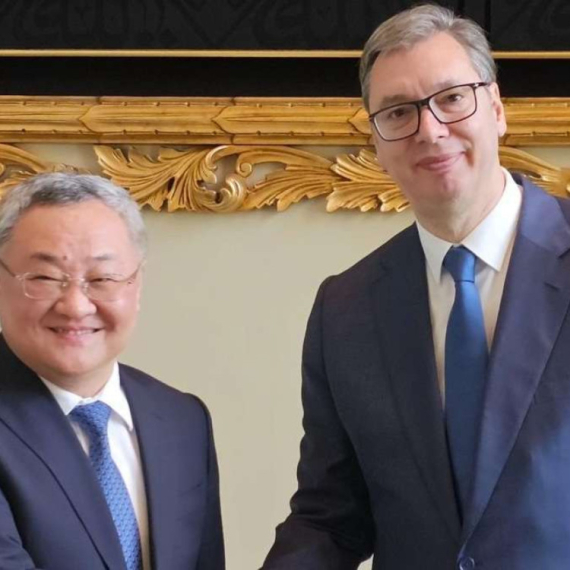Serbia "cannot accept IMF demand to cut salaries"
Finance and Economy Minister Mlađan Dinkić says it is "unrealistic at the moment" for Serbia to conclude an arrangement with the International Monetary Fund.
Tuesday, 09.07.2013.
09:46

BELGRADE Finance and Economy Minister Mladjan Dinkic says it is "unrealistic at the moment" for Serbia to conclude an arrangement with the International Monetary Fund. The government cannot agree to lowering pensions and public sector wages, he was quoted as saying by the Beta news agency. Serbia "cannot accept IMF demand to cut salaries" Deputy Prime Minister Aleksandar Vucic has said at the same time that Serbia "needs the IMF" - but that he would "like the fund to be less strict." Dinkic spoke during the "Serbia Turning to the Economy" conference in Belgrade on Monday to say that Serbia "cannot accept the IMF's stance that public sector wages above RSD 40,000 (EUR 350) and pensions above RSD 25,000 (EUR 220) should be cut by ten percent in order to additionally reduce the budget deficit." According to Dinkic, that would not result "in the targeted budget deficit cut, and would lower domestic demand and slow down economic growth." Instead, the country "plans is to make an arrangement with the World Bank in which that financial organization would support the implementation of structural reforms and the completion of company restructuring." IMF Resident Representative in Serbia Bogdan Lissovolik has said that the rebalance of the 2013 Serbian budget was a step in the right direction because it limits expenditure, but he underscored that this is not enough to avoid a structural fiscal deficit risk. "Additional deficit reducing measures are needed, but not only for the 2013 budget, but in the medium-term as well," said Lissovolik at the conference in Belgrade. He said that Serbia had not started important structural reforms and specified that for now nothing had been done to reform the pension system or how wages are paid in the public sector, nor had there been any labor market reforms. The conference in Belgrade on Monday (Tanjug) Beta
Serbia "cannot accept IMF demand to cut salaries"
Deputy Prime Minister Aleksandar Vučić has said at the same time that Serbia "needs the IMF" - but that he would "like the fund to be less strict."Dinkić spoke during the "Serbia Turning to the Economy" conference in Belgrade on Monday to say that Serbia "cannot accept the IMF's stance that public sector wages above RSD 40,000 (EUR 350) and pensions above RSD 25,000 (EUR 220) should be cut by ten percent in order to additionally reduce the budget deficit."
According to Dinkić, that would not result "in the targeted budget deficit cut, and would lower domestic demand and slow down economic growth."
Instead, the country "plans is to make an arrangement with the World Bank in which that financial organization would support the implementation of structural reforms and the completion of company restructuring."
IMF Resident Representative in Serbia Bogdan Lissovolik has said that the rebalance of the 2013 Serbian budget was a step in the right direction because it limits expenditure, but he underscored that this is not enough to avoid a structural fiscal deficit risk.
"Additional deficit reducing measures are needed, but not only for the 2013 budget, but in the medium-term as well," said Lissovolik at the conference in Belgrade.
He said that Serbia had not started important structural reforms and specified that for now nothing had been done to reform the pension system or how wages are paid in the public sector, nor had there been any labor market reforms.


























































Komentari 0